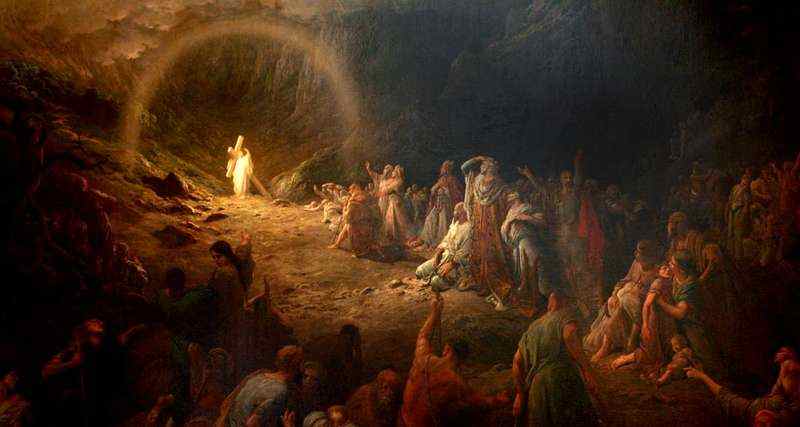What does the Bible say about Jesus’ so called descent? More than most people realize. The descent never is the main topic of any book of the Bible or even clearly the subject of so much as a paragraph. Oddly, in the clearest reference to it, the descent of Jesus isn’t even the topic of the sentence. It is only a clause. Surely, it can’t be very important then, you may think. Well, it was very important to the Old Testament redeemed. That is for sure. It is part of Jesus’ work of salvation. Plus, it pulls together and clarifies what seem to be several disjointed and obscure passages of scripture, and even gives an additional ray of hope to some peoples’ situations.
Let’s take a look at the passages that can be connected to Jesus’ descent, and see how they fit with the remaining theories of our list. The main one is 1 Peter 3:18-19:
For Christ also suffered for sins, the righteous for the unrighteous, that he might bring us to God, being put to death in the flesh, but made alive in the spirit, in which he went and proclaimed to the spirits in prison, because they formerly did not obey, when God’s patience waited in the days of Noah, while the ark was being prepared, in which a few, that is eight persons, were brought safely through water.
Peter makes this wild run-on sentence as a bridge between the topic of Christ’s death and baptism. In doing so, he drops a rather distracting piece of information in our laps. He tells us that Christ went in spirit to preach to people from Noah’s day. Then he leaves the topic, temporarily. These people are in prison not comfort, and Jesus speaks to them in the spirit (which only suggests that His physical body was still in the tomb). They are there because they disobeyed rather than believed. The prison must be the bad neighborhood of Sheol. To be formally in Hell would mean being forsaken. That wouldn’t include a visit from Jesus for any reason. What did Jesus say to them? Theories abound on this. Information does not.
The standard answer, at least among Lutherans, is that Christ is proclaiming His victory. In other words, this theory makes it something like a touchdown dance for Jesus, but there is no proof of such an interpretation. The Bible does say that Jesus made “a public spectacle” of the spiritual forces of evil, but that seems to be accomplished by his resurrection.
Sometimes exegetes make this a proclamation to Satan. Something like the taunt, “nyah, nyah, nyah, nyah-nyah.” First, that doesn’t sound much like Jesus. Second, there is nothing connecting fallen angels with Sheol–nothing biblical anyway. There are plenty of cartoons. Fallen angels are described as going to the Abyss. The confusion again is caused by using the word, “Hell”. In the final lake of fire (Hell), the contents of Hades are deposited along with the devil and his angels. That is a judgment day event (Rev. 20:10,14).
Another common interpretation is that Jesus didn’t descend anywhere, and that this passage refers to Jesus preaching through Noah during Noah’s lifetime. This answer is popular in the reformed tradition. It is also surprisingly the interpretation of Augustine, who accepts the reality of Christ’s descent, but doesn’t believe this passage refers to it. Either way, this is hardly a satisfying answer. Peter is doing a little word association, but to have him bounce to an event from a completely different time for no particular reason seems a little strange. In this interpretation, what is the prison? It also ignores all the other passages that will follow.
Why speak to people from Noah’s time? They are the specific recipients mentioned. God’s ways are not our ways, so it is not beyond possibility that Jesus specifically wanted to speak to this group. It seems more likely to me, that Peter chooses this group as representative of all the disobedient in Sheol, because of how they perished by water. Peter is making a point about baptism and speaks of their water experience as a parallel. Paul does a similar thing in speaking of Israel passing through the sea in 1 Corinthians 10.
Perhaps the content of the speech is only to tell them what they had missed. That would seem strange. The Eastern church has always thought that this visit was for more than that. As we will see, there is a passage to possibly support this theory. There is also another function of Christ’s descent that had support in both the East and the West but has little support in Protestantism. More about this is future posts.


In Holy Week, you wrote about ‘Understanding Christ’s Descent’. I sent chapters one and two to my Uncle (life long Lutheran) in Minnesota and to my neighbor (late stage IBM patient here in Newburgh and Nazarene) because I was inspired to do so. Keep writing your blogs and insights. They are an inspiration (even to us of child-like faith in Christ our Savior)! Bless you, Wayne Weber
LikeLike